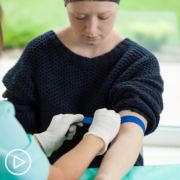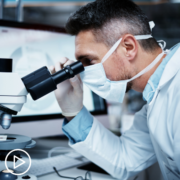What Could Boost COVID Vaccine Effectiveness in CLL Patients?
What Could Boost COVID Vaccine Effectiveness in CLL Patients? from Patient Empowerment Network on Vimeo.
Many patients with CLL worry about whether the COVID vaccine will be effective for them. Dr. Catherine Coombs explains how the vaccine works for CLL patients and available options to boost its efficacy.
Dr. Catherine Coombs is an Assistant Professor of Medicine in the Division of Hematology at The UNC Lineberger Comprehensive Cancer Center. Learn more about Dr. Coombs here.
Related Resources:

|

|

|
Transcript:
Katherine:
COVID is of course another factor that impacts a patient’s ability to fully thrive with CLL in today’s world. Many CLL patients are concerned about the effectiveness of the COVID vaccines and their ability to make enough antibodies to fight the virus. So, what do we know about how effective the COVID vaccines are for people with CLL?
Dr. Coombs:
The COVID vaccines – we were fortunate in being able to build on some earlier research. Even prior to being able to look at the data for COVID vaccines, there have been studies looking at vaccines in general in CLL. That’s actually been a long-term established issue, which is that based on earlier studies we knew most vaccines were not as efficacious in individuals with CLL compared to people without.
That’s due to this underlying immune deficiency. Since then, they’ve done studies looking at COVID specifically, and we have found lower rates of production of antibodies in individuals with CLL compared to regular, non-CLL controls. There have been a few different studies looking at this. I think the things that have been seen universally is that the CLL patients that are the most severely affected are those that are actively on therapy or have had recent anti-CD20. The CD20 drugs really wipe out the ability to make antibodies probably for a year, if not up to two years.
The other drug class that can really hamper the ability to make antibodies are these BTK inhibitors. Then, venetoclax to some extent, it’s often paired with the CD20, so it’s hard to tease out the effect. But it likely hampers the ability to make antibodies as well, but just not as much as the CD20, which it’s often given concurrently with.
CLL patients who have never had therapy can make a decent amount of antibodies, but still quite a bit less than an age-matched control. So, someone also your age without CLL. That was a lot of data based on the original two vaccine series. The Leukemia & Lymphoma Society did a study that I actually referred a lot of my patients to, where they collected samples, looked at antibody levels, and they found that giving the booster did seroconvert a good amount of patients who were negative that then became positive for antibodies.
That’s one of the reasons I’ve really encouraged the booster. This is now talking about the third shot. Now there’s this whole separate discussion about doing a fourth shot. I think the data’s a little too early to say it’s definitely helpful. But I think it’s certainly unlikely harmful. The vaccines don’t quite work as well. I feel very strongly they’re not harmful.
Not to say any shot can’t cause some issue occasionally. But I think that’s very, very rare. I always encourage my patients to get the vaccine, but I separately say, “Gosh, I wouldn’t use this as an end-all cure because it may not work at its 100 percent efficacy level due to the underlying CLL, and worse when you’re under treatment.”
Katherine:
We had another audience member send in a related question: “I’ve heard there is a treatment to help boost COVID antibodies. What is it, and how can I get access to it?”
Dr. Coombs:
I was going to bring that up actually, then I figured there was probably another question coming. I’m hugely enthusiastic about the drug that this person is speaking about. It’s called Evusheld. E-V-U-S-H-E-L-D. It got this emergency use authorization designation in December of 2021, so it’s pretty new. The idea behind this drug is that “Gosh, we know that not everyone is going to mount an effective immune response to vaccines, based on their own immune system, inability to make good levels of antibodies.”
So, it’s two antibodies that were manufactured as this drug. So, it’s a drug that’s actually two different antibodies. It ends up being in two different vials, so you get two shots. It provides really remarkable protection against COVID. They’re long-acting antibodies, so they last for six months.
The publication from the study that led to this being released showed an approximately 80 percent reduction in COVID for the people who got the shot as opposed to the people who got the placebo.
Katherine:
It sounds like patients could ask their doctors about where they might be able to access this?
Dr. Coombs:
Yeah. I think the best person to ask would be your CLL doctor. Because the drug, unless things have changed recently, it’s largely being focused for immunosuppressed individuals. Primary care doctors may not necessarily know a lot about it, but most oncologists are the ones who should have access to it. So, I would say ask your CLL doctor. If you’re in a smaller site that doesn’t have it, they may know in your geographic region where it could be gotten.









